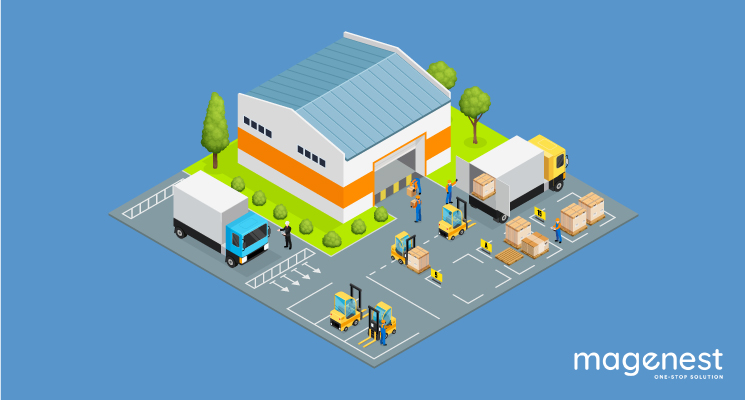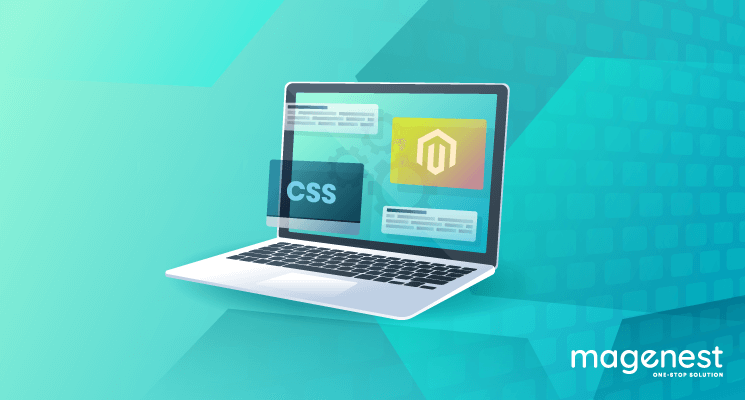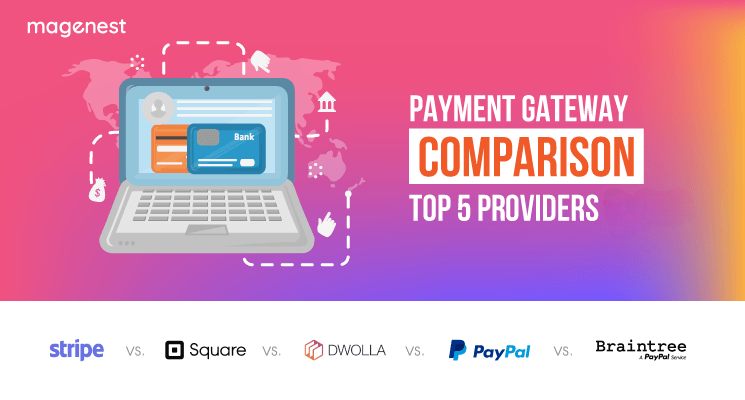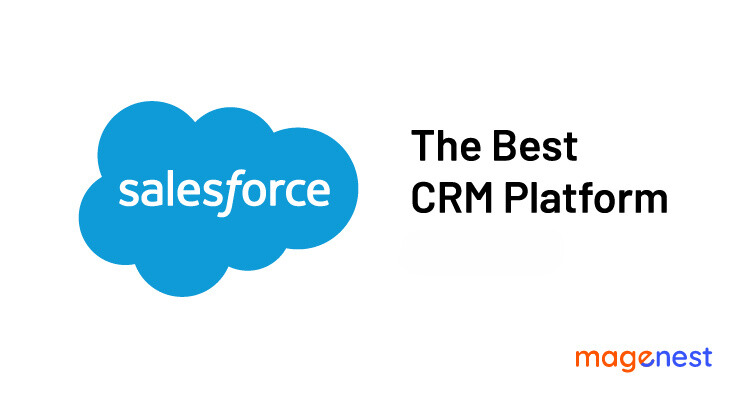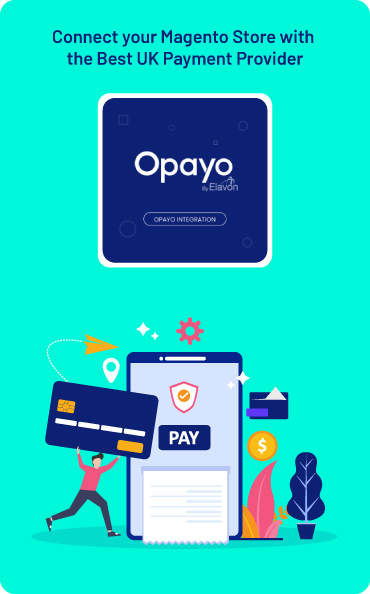For any online merchants, choosing a platform has a considerable impact on business growth.
Picking the right one is like having a solid foundation toward success. Otherwise, start with a wrong eCommerce platform will certainly harm your business soon.
If you are building an online store from scratch and wondering how to choose the right platform, you have come to the right place. There are so many eCommerce platforms claim to be the best. Do not waste your time or money on a second-rate eCommerce platform, which does not work for you.
What is an eCommerce platform?
An eCommerce platform can be simply defined as a piece of software from which store admin can create their online stores and manage them properly.
Entrepreneurs prefer to use an eCommerce platform because it helps them significantly reduce the required time from doing unnecessary technical tasks and focus more on selling and marketing side.
Together with additional software, eCommerce platforms of all kinds effectively assist the store admins in dealing with accounting, order management, or customer service, etc., without requiring too many efforts.

ECommerce platforms include three main types:
- Self-hosted (Open Source): Because you pay to build your website online, you have full control and make customizations as you see fit.
- Hosted (Saas - Software as a Service): Hosted websites are all-in-one packages. You don’t own your hosting space, and you can only use the tools available on the platform. The monthly fee is required.
- Mixed (CaaS - Commerce as a Service): Mixed hosting is where you take a self-hosted platform and integrate elements of hosted platforms.
The cost of eCommerce platforms varies massively, depending on the kind of platform you choose and the plan you use.
Key features of eCommerce platforms
There are different platforms with different features, which may get you overwhelmed. From our practical experience, we suggest you consider these evaluation factors to find the winner:
- Run-on a single, unified platform
- Offer a complete customer view
- Intelligent order management
- Provide superior customer experiences
- Support bottomless expansion
- Offer a high level of site security
- Easy to create content
- SEO
- Highly dedicated support and document
8 best platforms to build your eCommerce store
Magento
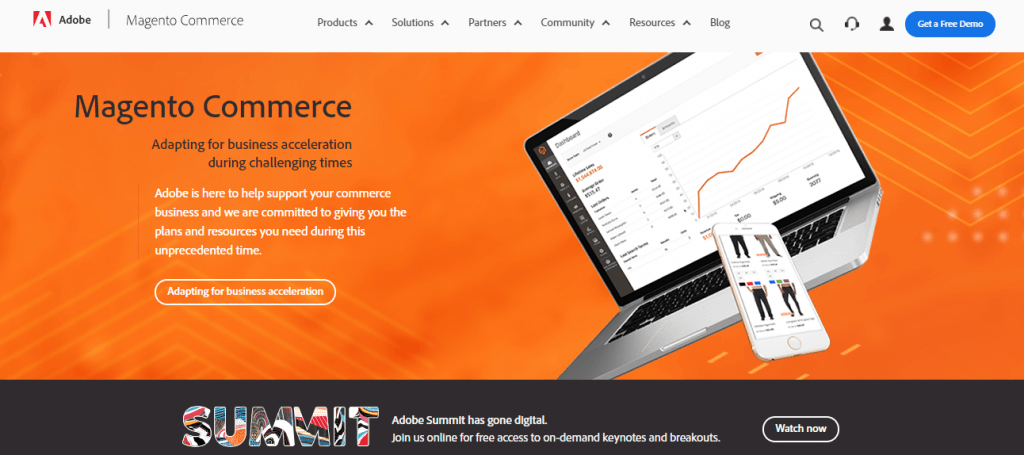
Magento is one of the most used eCommerce platforms in the world.
Although it is also well-known for being incredibly complicated, there is no platform other than Magento, which can create a unique, unlimited, and engaging shopping experience.
Magento collaborates closely with the world’s largest retailers, brands, and branded manufacturers over B2C and B2B enterprises. This is an ideal platform not only for long-term professional e-commerce websites but also for fast-growing small businesses.
Pros
- Versatile content management
- Mobile-friendly configuration
- Advanced search engine optimization
- Sturdy and spacious
- Flexible third-party integrations
- Customizable security permissions
- Save time and money
Cons
- Pricey themes
- Requires development skills
- The free version needs more advanced features and apps that are not free
Price
The Community version of Magento is free. However, if you want an Enterprise edition, it is approximately $20,000 annually.
Shopify
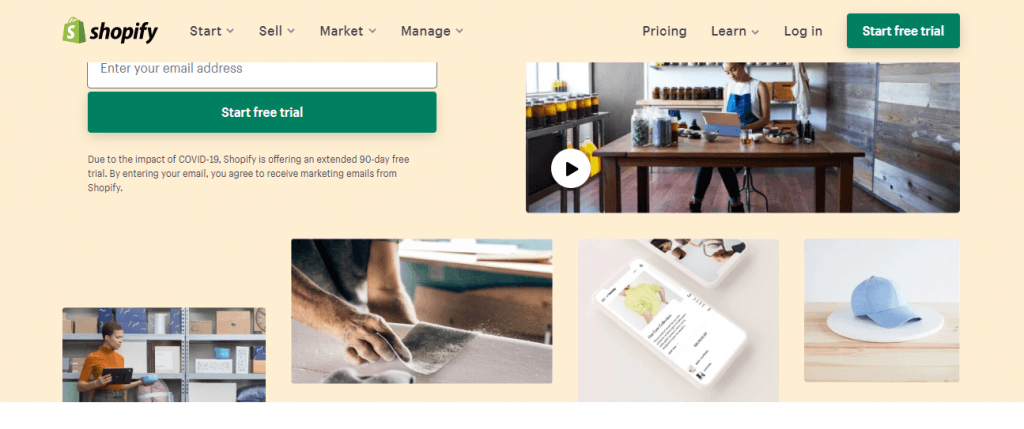
Shopify is a well-known commerce platform made for small and medium-sized industries. They can use this software platform to install, design, set up, and control their stores across various sales channels, including search, mobile, social media, affiliate programs, and marketplaces.
Shopify presently houses more than 500,000 stores in around 175 countries, supports more than 1 million active users. It is also is reputable by brands such as Red Bull, Nestle, GE, Kylie Cosmetics, etc.
Pros
- 100+ User-friendly Professional themes
- Easy to customize your online store
- Mobile commerce ready
- Friendly website builder
- Full blogging platform
- Support 100+ payment gateways
- Support Multiple languages
- App Store Integrations
- Support for essential marketing tools
- Web hosting and security is taken care of
- Search engine optimized
Cons
- The limited product attributes: size, color, and material
- Expanding the features needs additional fees.
- Customization can add up to the expenses.
Price
The free trial lasts for 14 days. After that, you can consider purchasing one of five plans:
- Lite: $9/month
- Basic Shopify: $29/month
- Shopify: $79/month
- Advanced Shopify: $299/month
- Shopify Plus: pricing differs depending on the requirements
Big Commerce
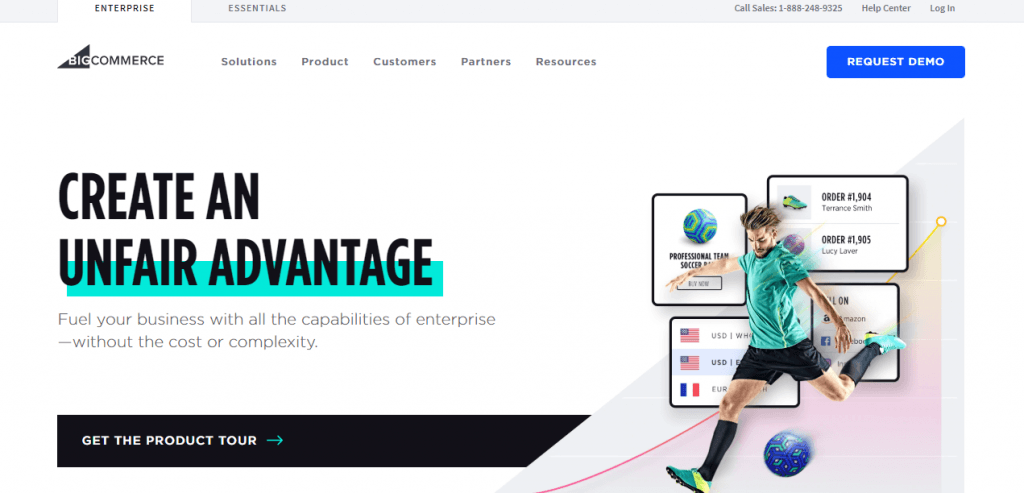
Big Commerce is a leading cloud-hosted eCommerce platform in the market. BigCommerce provides you with a comprehensive set of eCommerce tools with the high flexibility of customization, beautiful themes and templates, highly flexible APIs, and many more.
This platform powers more than 50,000 SMBs, 2,000+ middle-level market companies. Toyota, Ben & Jerry’s, Gibson, Martha Stewart are the famous brands using this platform.
Pros
- Integrate with robust eCommerce add-ons and apps
- Completely customizable
- The hosting offers 99.99% uptime
- Mobile friendly with mobile payment options
- Integrate with 3rd party email marketing solutions
- Protected by multiple layers of security
Cons
- Extra fees for successful customers
- Expensive BigCommerce themes
- No lite version
Price
BigCommerce offers a lot of useful and easy-to-use features, and you can try them out yourself free for 15 days. There are three plans supported: Standard - $29.95/month, Plus - $79.95/month, Pro - $199.95/month
You will also save 10% if you pay annually. These plans include no transaction fees, unlimited products, unlimited file storage, and unlimited staff accounts.
Woocommerce
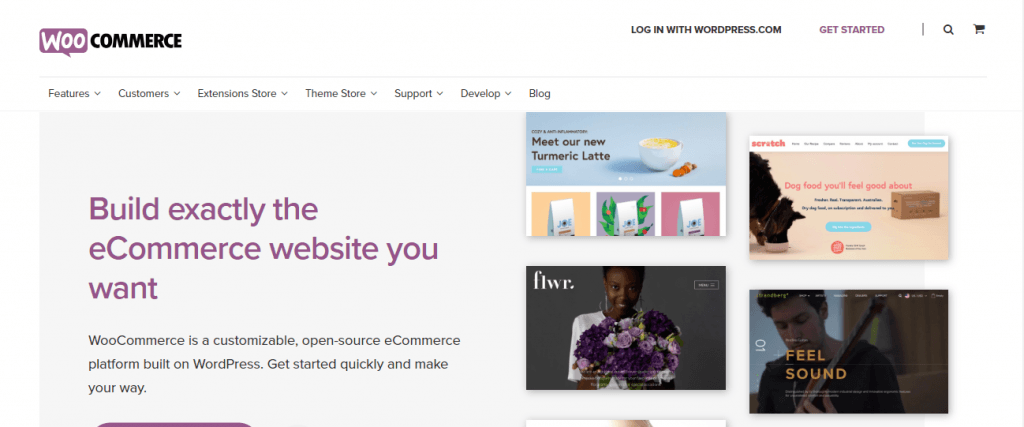
WooCommerce is a flexible and open-source e-commerce plugin, which is a boon for those who use the WordPress platform. The most significant benefit of Woocommerce is that you have full authority to manage the merchants and sell anything such as physical products, digital, and also affiliated goods.
WooCommerce powers around 25% of online stores worldwide, with over 74 million downloads.
Pros
- Countless themes
- Highly customizable
- Built-in blogging
- Works on all devices
- Search engine friendly
- Many marketing functions and plenty of additional integrations
Cons
You need to buy a domain and web hosting because a WordPress plugin doesn’t come with hosting.
Price
It is free for standard features on a self-hosted WordPress site; from $29 for additional extensions; transaction fees depend on the payment gateway
Some of the extensions are free while for the others you need to pay a subscription
OpenCart
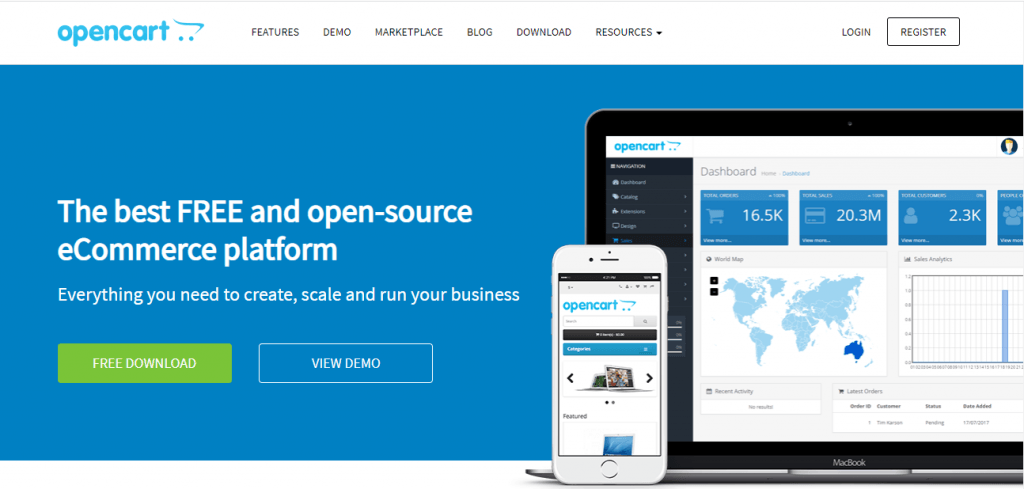
An open-source platform for online shopping, Opencart is free to download, and you can customize the platform itself as per your needs.
You can find amazing features for just about any sector, service integrations, payment gateway providers, delivery methods, marketing, reporting, sales along with language packages. Woocommerce is completely beginner-friendly and perfect for small and medium eCommerce businesses.
Pros
- Simple to set up/use
- Performance and usability
- Support unlimited numbers of products, categories, customers, and transactions
- Multi-Store functionality
- Multilingual and multi-currency support
- Dedicated support
Cons
- Not easy to customize
- Need extra plugins for strong performance
Price
The software itself is free; however, there are some additional costs though (hosting plan, domain name, other modules/extensions)
Wix

Wix is listed among the top website builder for small businesses. It is a reliable platform that more than 150 million users around the world are using. At this time, there is no competing website builder, but Wix offering versatility and practical functionality. This platform is so simple that anyone can create a great-looking site using the Wix platform.
Pros
- Easy to use
- Competitively priced
- Provide a web development platform for developers to implement advanced features
- Provide more than 500 templates
- Offer over 300 apps both in-house and third-party module
- Awesome feature packages suitable for restaurants, hotels, event planners, and photographers
Cons
- Customer support is a weakness
- A few business features are not advanced enough for large businesses
- Some reports of glitches, bugs, and slow loading times
Price
Free for 14 days; from $23/month Business Basic Plan; transaction fees depend on the payment gateway.
Weebly
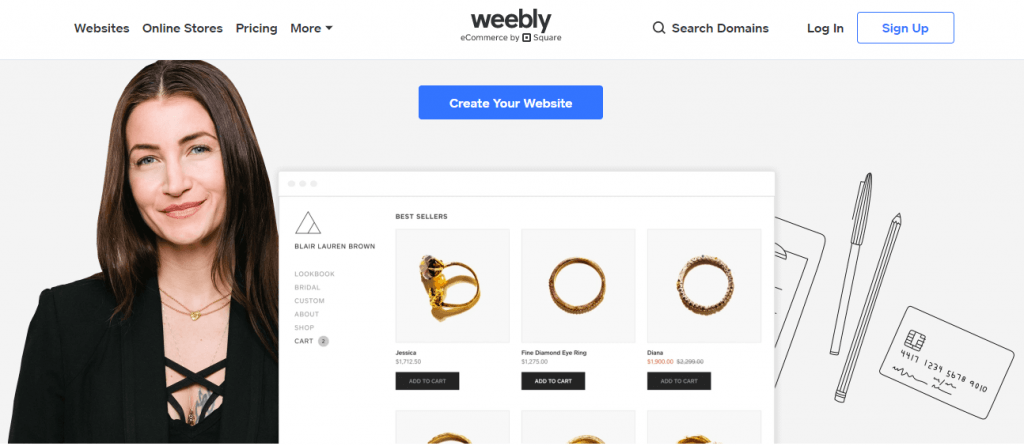
Another more well-known website platform that we suggest in this list is Weebly. This is an excellent platform for someone looking for a simple store with marketing automation built in to present products or services in a clear, simple, affordable manner.
Pros
- Support drag and drop builder tool
- Have dozens of mobile-responsive templates with modern designs.
- Amazing blogging features
- Include designed layouts for your web customization
- Some ECommerce features are still available even with a free subscription
Cons
- Impossible to restore websites yourself, you will need help from the Weebly supporter
- No free domain name included
- Customer service can be a weakness
Price
You can try the Weebly Starter plan at $8/month, a free trial included.
Volusion
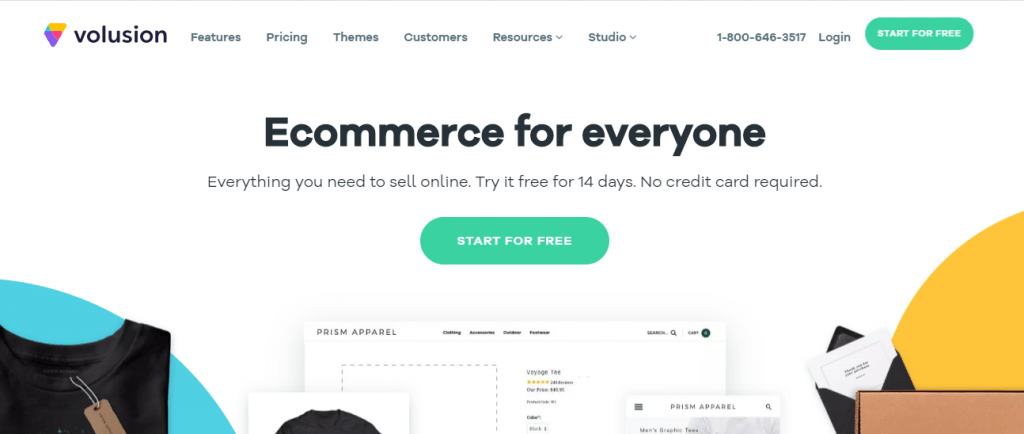
Launched in 2002, Volusion has emerged as one of the best eCommerce platforms all-in-one online shopping solutions for startups to large enterprises, allowing them to sell their physical products quickly. It offers a lot of free themes and premium themes that you can customize and edit with a drag-and-drop builder.
Pros
- Multiple responsive themes
- Rich content visual editors
- Rich CSS editor
- Well organized dashboard layout
- Store management mobile app
- Easy customization
Cons
- Blogging is a weakness.
- Slower platform than the others
- Lacks up cross-selling features
Price
Starts from $29 per month
Conclusion
There are many other eCommerce platforms out there. No matter what platform you choose, flexibility, control, and customization are highly essential features that you should keep in mind. Do not stuff your site with the functions that put you at a disadvantage. You should weigh each of these factors differently, depending on the needs of your business.




